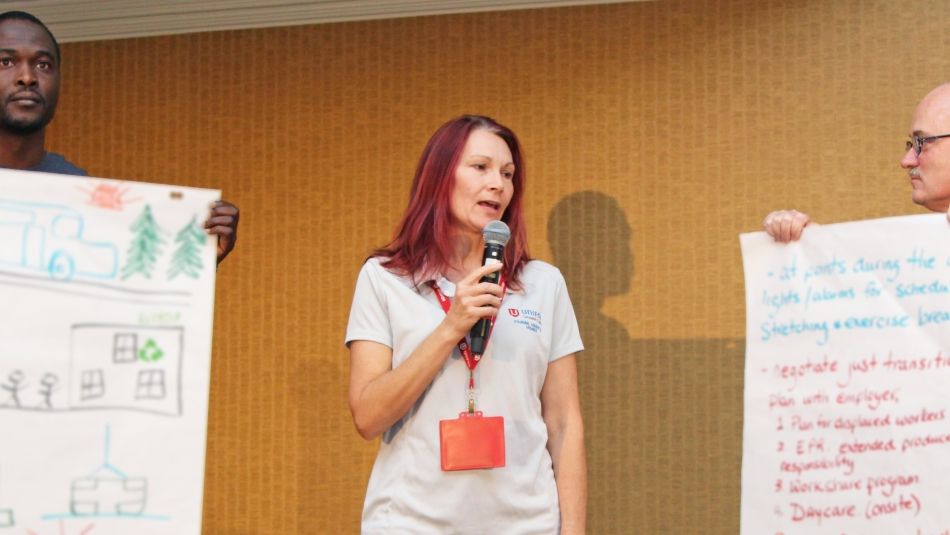
Share
More than 150 Unifor members and staff gathered in Saskatoon from September 22–24 to convene the inaugural Just Transition conference.
Just Transition is the term used to describe progressive policies that protect workers during an industry’s transition to a more sustainable model. It is most often applied to sectors with heavy greenhouse gas emissions, but Just Transition can apply to virtually any sector.
“The transition to a more sustainable economy is the critical challenge of our lifetime, but it will not be done by casting workers aside,” said Gavin McGarrigle, Unifor Western Regional Director in opening remarks to participants. “So much of the discussion so far has simply been about targets and about reducing emissions—workers are often an afterthought. That’s wrong. We must fight to be at the very centre of these discussions and fight for good jobs for all going forward.”
Following McGarrigle, the conference opened with a presentation by former Unifor Senior Economist Jim Stanford on what a Green New Deal could look like in Canada. Stanford emphasized that Canada has been through resource boom and bust cycles too many times before, and the environmental imperative to reduce fossil fuel dependence can ultimately lead to better jobs in a more stable economy.
Unifor National Secretary Treasurer Lana Payne opened the second day of the conference with remarks on the importance of unity among workers. She said false narratives of scarcity by employers threaten to pit workers against each other, but building a just society will rely on solidarity to keep all workers’ concerns front and centre.
Saskatchewan NDP Leader Ryan Meili spoke about his party’s work in opposition to Premier Scott Moe’s conservative government. He pointed to specific examples of the ways that the government’s malaise and corruption has hurt the province’s workers and has actively blocked green jobs efforts.
Meili was followed by a diverse panel of guests invited to discuss “Getting it Right”, focusing on principles and examples of democracy and working peoples’ involvement in decision-making. “Nothing about us, without us” was the common refrain among both panelists and Unifor member discussions on the issue.
Later in the day, participants heard from the Alberta Federation of Labour’s Gil McGowan and Steelworker Roy Milne about the experience in Alberta working with the NDP government on Just Transition initiatives.
McGowan stressed that while many more “doors were open” in the worker-friendly government of Rachel Notley, unions still had to drive the agenda and play a key role in policy development and pushing aggressive timelines. Milne said that what was accomplished under the Notley government in coal transition was truly unique and could have never been accomplished under Liberal or Conservative governments.
On the final day of the conference, participants heard from University of Saskatchewan professor Priscilla Settee, who discussed the often ignored but essential perspectives of Indigenous communities and the role of partnerships in making green economic transitions truly just. She stressed that building meaningful relationships with Indigenous groups is mandatory and that unions should join in opposing resource grabs that ignore land and title of First Nations.
The remainder of conference time was spend in various group discussion exercises that let participants share experiences from their own lives and how the lessons and principles from speakers could be integrated into Unifor’s next steps.


